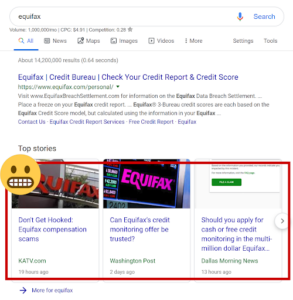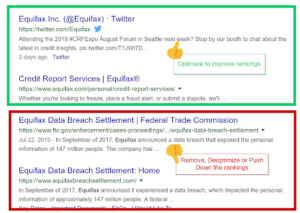The Power of Online Reputation Management: Defend, Repair and Leverage Your Brand’s Image
In today’s digital world, the power of perception has never been more vital. A single negative review or a damaging news story can significantly impact a brand’s reputation. It is here that the vital role of Reputation Management comes into play. This process involves monitoring, mitigating, or influencing the digital footprint or reputation of an entity, either it being a brand, an individual, or a business. In this comprehensive guide, we delve into the critical aspects of reputation management, its importance, and effective strategies that can be employed to manage and enhance your brand’s reputation.
The Impact of First Impressions and Online Perceptions
According to a study conducted by the Missouri University of Science and Technology, a visitor takes less than 0.2 seconds to form an initial impression of your brand. Following this, they spend a mere 2.6 seconds reinforcing this impression.

In the digital realm, first impressions are often formed through a search engine result page (SERP). When a potential customer searches for your brand and encounters negative results, it can set off alarm bells in their mind, possibly leading them to abandon their search or delve deeper into the negative feedback. Both scenarios are detrimental for your business.
Understanding the Importance of SEO Reputation Management
Negative search outcomes can cause you to lose nearly 70 percent of potential business. However, this is not the only way a poor SERP can impact your business. Here are five reasons why SEO reputation management matters:
1. Reduction in Organic Search Traffic
A poor reputation can lead to a significant drop in organic search traffic. When potential customers see negative results linked to your brand, they may choose not to click on your site’s search result or even abandon the search entirely. Furthermore, if the negative results are clicked on, they may eventually outrank your positive search results, further impacting your traffic.
2. Decrease in Paid Search Traffic
Negative search results can also impact the effectiveness of your paid ads. Even though Pay-Per-Click (PPC) ads might help you secure a high spot on the SERPs, they cannot hide the negative results, leading to fewer clicks.
3. Decreased Effectiveness of Overall Marketing Spend
Prospects often resort to Google to reach your site, regardless of the marketing channels you use. However, negative Google search results can undermine all the marketing efforts you’ve invested in, unless you manage them effectively.
4. Diminished Profitability
When your brand reputation is damaged, it becomes challenging to command a premium price for your product or service. Negative perception and decreased traffic lead to a drop in your selling points, with consumers less willing to pay a premium or even the market price for your product or service.
5. Decline in Company Value
A significant portion of a company’s value is derived from its reputation. Negative results can erode your business’s goodwill, influencing how your investors, lenders, vendors, and other business partners perceive you.
Implementing Reputation Management SEO: A Practical Guide

Online reputation management (ORM) can help you positively portray your company as trustworthy. It involves monitoring, addressing, or mitigating search engine results or mentions in online media and web content to manage customer perception.
Online Reputation Management in Digital Marketing
Online reputation management in digital marketing refers to the act of controlling or influencing your brand’s reputation as it appears in digital platforms, particularly in search engine results. It is an integral part of SEO services.
Effective Strategies for Online Reputation Management
The underlying principle of search engine reputation management is to populate the first page of SERPs for a specific term with positive results. This includes not only ranking relevant pages from your domain but also boosting positive news stories, social media feeds, your Google Business Profile, and other pages related to your company.
Strategy #1: Amplify Positive Organic Search Results Rankings
It is essential to focus on the positive results associated with your brand and boost their ranking in the search results. If there are not enough positive results, you can create them by implementing various strategies as part of your reputation SEO.
Strategy #2: Remove, De-optimize, or Alter Negative Search Results
While it is challenging to get negative search results removed, it is always worth an attempt. Negative results can originate from multiple sources, including negative press, government notices, complaints on various sites, litigation records, negative reviews, negative forum comments, and direct attacks through an exact match domain or a dedicated site.
You can mitigate some of these types of search results by working directly with the content host or creator, offering compensation, or through a legal notice if the content is defamatory, libelous, and untrue.
Strategy #3: Outrank Negative Search Results
To outrank negative results on the first page of SERPs, you’ll have to optimize up to nine other results. To push them down to page three, you might need to optimize up to twenty results. This process can be complex, but with the help of a qualified SEO agency , it is achievable.
Effective Ways to Enhance Your SEO Reputation Management
Now that you’re aware of the three strategies you can use for ORM, it’s time to take action. The following tactics can help you manage negative results and restore your reputation.
1. Identify Impacted Keywords
Identify the search phrases that are more likely to bring up negative results. You can use tools like Google Search Console and Ahrefs to identify the impacted keywords and their volume and position.
2. Begin an SEO Reputation Campaign for Your Site
Ensure your site’s ranking for branded queries is strong by cleaning up your site’s technical SEO issues, adding more quality content, and building authoritative backlinks to key pages.
3. Optimize a Second Page for Your Brand Name or Specific Keyword
Google often allows two results from a branded site for branded search. Therefore, ensure that both your home page and a second page are completely optimized for your brand with long-form content and have authoritative backlinks pointing back to them.
4. Optimize Your Google Business Profile
Update and optimize your Google Business Profile to ensure it shows up in the SERPs. Your GBP allows you to create a business description, add photos, and create posts.
5. Encourage Positive Reviews
Encourage your satisfied customers to leave reviews that can help balance out any negative ones.
6. Claim Social Media Accounts
Claim accounts on the largest social media sites and optimize your profile around your branded keywords. These profiles can help you further push down negative results in SERPs.
7. Conduct SEO Campaigns for Other Properties You Control
Consider what other properties you can influence. Google your business name and explore the results to see what web properties come up that you can optimize either directly by editing the content or indirectly.
8. Build Links to Positive Results You Don’t Control
Boost the rankings of positive results you don’t control, like links to Wikipedia, Owler, Bloomberg, Crunchbase, or other database profiles about your brand, via link-building to push down negative search results.
9. Post Images Representing Your Brand & Target Keywords
Posting images to your site or social media can help them appear in the image results and push down negative results.
10. Create Videos
Create informative, short videos that speak to the topic at hand and place them on Youtube, Vimeo, or other video hosting sites. Build links to these videos to enhance their rankings.
11. Launch New Long-Form PR Content
A PR campaign can be a good short-term way of addressing your brand’s SEO reputation. When creating a press release, optimize it for SEO before syndication to increase its chances of ranking.
Safeguard Your Brand with Online Reputation Management
Protecting your reputation online is a critical aspect of gaining your customer’s trust and maintaining a competitive edge over others. However, maintaining a positive public reputation on Google is a complex process that requires in-depth knowledge about SEO.
Whether you need to boost your SEO campaign, optimize your Google Business Profile, or build links to positive search results, Chili – a specialized agency can help. Schedule a free SEO consultation, and let’s talk about repairing your brand image.



Join the discussion - 0 Comment